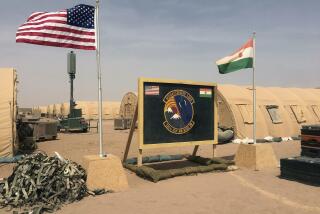Action at Camp Pendleton Stirs Rumors, Fears
CAMP PENDLETON — This Marine Corps base is being mobilized like it hasn’t since the Vietnam War, with troops packing up their M-16s, their radio gear and just the most essential personal belongings and being shipped out on hours’ notice to uncertain destinations, according to civilians and military on base.
For the anxious and sometimes tearful families that they’re leaving behind, there is little doubt that the Marines are headed for the Mideast and are perhaps destined for desert warfare against Iraq.
“My son called me about 10 this morning. He was whispering into a pay phone. He said he wasn’t supposed to call me, but that he wanted me to know he just got his orders and had to pack right away,” said the mother of a lance corporal infantryman.
“He said he couldn’t tell me where he was being deployed, or how--or that he even had orders, and that he had to hang up and go,” she said. “I just started crying.
“But I think he has to go. There’s no choice,” the woman said of the plight of her son and hundreds--if not thousands--more who were leaving Camp Pendleton this week. “He’s prepared for this, mentally, and in a way I think he’s a little bit excited.”
The action during the past couple of days appeared to belie comments by Gen. Alfred M. Gray, commandant of the Marine Corps, who held a press conference at Pendleton on Wednesday specifically to say that there were no immediate plans to deploy Marines from the base to the Middle East and that they were not on any special readiness status.
“We have to just wait and see how the various diplomatic and economic options fare here and see what transpires,” he said two days ago.
Marine families had little more information to work on and said they were confused and a little angry about the secrecy.
The wife of a lieutenant said she was told by her husband Monday night that his 900-man battalion would be deploying Tuesday and Wednesday. She hasn’t talked to him since.
“I don’t know what’s going on,” she complained. “I know that he couldn’t talk to me except in person because of fear the phones were tapped, and even in person, all he could tell me was that something could always happen (as a Marine), and that now it’s happened.”
He told her he was going to the Marine Corps Air-Ground Combat Center at Twentynine Palms, the sprawling 932-square mile desert facility in San Bernardino County that plays host to desert training games and has an 8,000-foot air field.
He didn’t say where he would go after that, the wife said, “but, by how he acted--and I know him--I got the impression he was going to the Mideast.”
For their part, Marine Corps and Pentagon spokesmen had little to say about the reported troop movements from Camp Pendleton.
“No comment,” said Capt. Rose-Ann Sprignoli of Camp Pendleton’s public affairs office.
Why the silence?
“I can’t speculate on why our comment is no comment. I’ve been given orders from headquarters, Marine Corps, which it got from the Pentagon, that there is no comment on troop movement, and so that is our comment.”
Lt. Cmdr. Ken Satterfield, at the Pentagon, said:
“I can confirm for you there are not Marines involved in this operation at this time. I won’t get into alert status, but I can confirm there are no Marines involved in this (Mideast) operation at this time.”
He added, “What might happen, I can’t say.”
Pentagon sources said Marines at Camp Pendleton are unlikely to be deployed in large numbers soon, although they could be called into service in several weeks as the U.S. military presence expands.
However, Lt. Gen. Walter Boomer, commander of the 1st Marine Expeditionary Force at Camp Pendleton, has been selected to command all Marines deployed to Saudi Arabia, the sources said. He will leave the base soon, accompanied by a small coterie of aides, they said.
A Marine Corps major based at Camp Pendleton, who also insisted on anonymity, warned that military families may be overreacting to troop movements to Twentynine Palms because they might be little more than routine training exercises.
“We’re not officially on alert,” he said. “But various units have been told to do the things their units would normally do to bring themselves up to readiness and to be ready to move out.
“That involves a myriad of administrative things--records, medical screenings, those kinds of things,” he said. “We’re at an administrative ‘be-prepared’ status. People are drawing in to their units, getting records in line and packing up.”
One military source privy to troop movements said that 50 to 100 Marines have been shipped out of Camp Pendleton so far, destined for the Mideast. But family members of Marines say they believe the number is significantly higher.
Indeed, the neighborhoods surrounding Camp Pendleton were full of rumor and speculation, and seemingly little doubt, about what was going on.
Jennifer Johnson, the wife of a 10-year career Marine, said her own husband is “lying low” but that “every single woman on base is talking about this. It’s the conversation everywhere.
“I hear that a lot of husbands are calling their wives from work saying things like, ‘Bring me my glasses. I can’t come home. I have to leave right now, and I can’t say anything more.’
“A lot of people have gone. They’re getting on planes and leaving, but I don’t know where they’re going because I’m not on those planes. Maybe they’re going someplace else, but that’s not the general idea around here.
“I don’t know how people deal with that,” Johnson said. “But we’re all in the same situation, that anyone’s husband can go in a moment, and you lean on your friends, hold on to each other, and cry.”
She reflected on the seemingly blithe times for the military in recent months, capped by the successful visit of three Soviet warships to San Diego last week and the sailors’ tour of Camp Pendleton.
“Everything was starting to look good, then bam!” she said.
Sharon Champaign said her own husband, a corporal, has been told to get ready for an unscheduled deployment.
“He’s one of the ones getting ready to leave, but I don’t know when,” she said. “He’s going to the Mideast. That’s what they say.
“He hasn’t been coming home at night the last couple of nights. He said he’s getting ready to go, and that it can be at any time, and that he didn’t know where he was going.
“If he does know, I don’t. You now how they are. They’re keeping everything top secret.”
Even civilians who work with the military say they’ve seen signs of the mobilization.
An educational consultant said that, during the past couple of days, virtually all of her scheduled appointments on base have been canceled by the military.
One woman told her, she said, that when she came home from work Wednesday night, all she saw on her kitchen table was a note from her husband reading, “Something’s going down. I have to go back to the base.”
Tom Welch, a San Diego insurance agent who specializes in military insurance, said he has received calls from anxious wives in the past day or two, wanting to increase the life insurance on their husbands because they’ve been shipped out.
Welch said he explains to them that Marines with wives and children are, by law, automatically covered by a $500,000 life insurance policy if they are killed on active duty.
“I’m getting calls from moms and wives telling me that their husbands have already been shipped out, or are ready to deploy right now, and they’re scrambling for more life insurance,” he said.
His customers tell him, Welch said, that the Marines are first being sent to Twentynine Palms, from where they’ll receive their next orders.
Although Camp Pendleton public affairs spokesmen declined to identify how many troops would be available to move out on quick notice, even in a generic sense, a recently retired Marine familiar with base operations said Camp Pendleton is capable of moving out 7,000 troops in a 48-hour period.
Many of those Marines, members of the 1st Expeditionary Force, will leave with little more than their M-16s and the packs on their backs, and will eventually unite in the Mideast with military container ships that are based in Diego Garcia, the U.S. military base in the Indian Ocean, the source said.
Those ships will be put to sea and sent to a docking area near where the Marines can retrieve their supplies for 30 to 60 days of combat, he added.
Camp Pendleton plays host to the 1st Marine Division which, as a component of the First Expeditionary Force, is pre-assigned to the U.S. Central Command to provide rapid deployment forces to the Mideast, he said.
“Units at Camp Pendleton are capable of airlifting out of there in 24 to 48 hours, and their design responsibility is to respond to the Mideast,” he said. “It’s a scenario that we’ve rehearsed and rehearsed and rehearsed to death.
More to Read
Sign up for Essential California
The most important California stories and recommendations in your inbox every morning.
You may occasionally receive promotional content from the Los Angeles Times.









